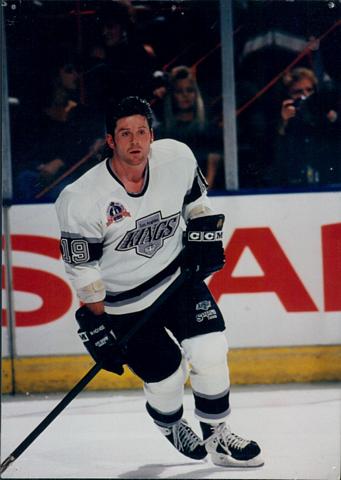Ex-LA Kings Enforcer Jim Thomson on Thriving Past His Drug & Alcohol Addiction
- Updated: August 22, 2019

From a fan’s vantage point, it looks nothing short of glamorous. Fame and fortune is what underlines the life of a professional athlete, especially one who has ever called sunny Los Angeles home. That goes especially for those who have had the opportunity to play alongside the incomparable Wayne Gretzky. But, while it’s easy to paint professional athletes in that glamorous light, it’s just as easy to forget that, despite all of the fame and fortune, these professional athletes are just as human as you or I.
For Jim Thomson, this was a reality.
Drafted by the Washington Capitals in the 9th round of the 1984 NHL Draft, Thomson would be thrown right into the fire, so to speak, as, in his NHL debut on November 1986, he was given the responsibility of covering one of hockey’s greatest players in Mario Lemieux. En route to establishing himself as one of the sport’s toughest players, Thomson would make stops in Hartford, New Jersey, Ottawa and Anaheim during his NHL career which also included two separate tenures with the Los Angeles Kings.
Thomson would play 115 games in the NHL, backing up his tough-as-nails persona with 416 penalty minutes. But, following a short stint with expansion Mighty Ducks of Anaheim in 1993-94, Thomson suddenly had to deal with life after hockey, following the Edmonton native down the dark path of drug and alcohol addiction.
I recently spoke with the former Kings enforcer who was gracious enough to share his journey with me.
“Some of the factors were that when you’re done [playing] hockey, it’s the depression that your life has changed immensely and it’s like you’re killing the fear of real-life, numbing the pain that the dream is over,” a candid Thomson offered. “So, what happens is you just spiral into this black hole of– it’s almost like you give up to the world. It’s like, ‘Okay, I’m done. My career’s over,’ so, you start blacking out, doing drugs and it’s just a vicious, vicious unraveling of your life and pretty soon, you’re so far ahead. Then, you’re basically asking yourself, ‘Can you get out of it or are you ending it?’”
Having spiraled so far down that black hole, Thomson may have contemplated the latter option more times than he cares to admit. Regardless, something inside the ex-enforcer urged him to keep going, as excruciating as that may have been at times. Yet, unlike other cases of reaching sobriety, there was no external influence for Jim Thomson; no interventions, no desperate pleas, and no tough love. Instead, Thomson’s breaking point came when he found a moment where he could truly be at peace with himself.
“I was actually flying home from Edmonton, my hometown,” Thomson began. “So, 11 years ago, on my son’s birthday, which is November 17, and it was a peaceful moment where I quietly said I was done. You never know, though, because when you’re an addict, whether it’s alcohol or drugs, you always say, ‘I’m done, I’m done, I’m done,’ and you end up using again a few days later, the next day, whatever. So, this was a different moment where, November 17, I got home and just quietly went about my business and 11 years ago, I took my last drink and my last drug.”
To make matters better, finding the motivation to be at peace with himself allowed Thomson the opportunity to really focus on what mattered most in his life.
“Nobody really inspired me. I did go to the NHL rehab but I relapsed after that for a bit, but they did educate me,” continued Thomson. “It was a place called Newgate 180, which is in Merrickville, Ontario. They helped me with tools in my life that got me the foundation to know what to do to once I was ready to become sober and after relapsing. I quietly said, ‘That’s it.’ I had three beautiful kids that I had to look at as a father, so that was my inspiration, but there really wasn’t one person that said, ‘Okay, you need help,’ so I did and I hid [the desire to quit] pretty well, I have to say.”
It may be a cliché that whatever doesn’t kill you makes you stronger, but in fairness, clichés are just that for good reason: they’re accurate. Jim Thomson is no exception to this as he has celebrated his life of sobriety by helping others thrive as athletes and as everyday people, ensuring that they don’t make the same mistakes he did.
“Well, it’s like this: I’m not afraid to tell my story,” the 53-year-old emphasized. “Number one: I talk about the drug abuse, the alcoholism, the pills — I was big-time into opioids — and I believe that the more you talk about it and somebody’s suffering from the addiction, it really helps them because they relate to you.
“You can go to a doctor and have Mom, Dad and whoever tell you, ‘Don’t do that. It’s no good for you,’ but I really believe my impact on a lot of people by sharing my story helps them in their recovery because they looked at me and I saved my life; and if they’re into that lifestyle, they need to save their own life.”
Part of the former Kings enforcer’s quest in helping others includes the initiatives and impact of his own organization, Jim Thomson’s Dream (www.jimthomsonsdreams.com). It is here where Thomson plays many roles, including mentor, coach, and public speaker, while also appearing publicly at a myriad of functions from luncheons to golf tournaments.
“It started off where I was teaching hockey,” said Thomson. “Then, once I learned more about recovery and more the disease of alcoholism and drug addiction, one fell into the other and I started doing guest-speaking, I start doing some life-coaching, I started working with a lot of people behind the scenes. Next thing you know, I’m doing 50 percent hockey, 50 percent interventions and helping people with trying to live a healthy life.”
While he proudly continues to help others in the fight against addiction, though, Jim Thomson’s love for hockey remains close to his heart.

Thomson with some of his Tigers’ players (Aug 2019)
Photo courtesy of Jim Thomson’s Instagram (@jimthomson33)
Thomson and his wife, Rita, own and operate the Aurora Tigers of the Ontario Junior Hockey League, guiding aspiring young players and helping them prepare for the major-junior level and beyond, but also to help shape them into quality human beings off the ice.
“My wife and I run the hockey team and being a former NHL player, I like to put my input but I let [the GM and coaches] do their jobs,” admitted Thomson. “My thing is, though, to make sure we pick a good team with good characters for the town of Aurora. We don’t want bad apples, if you will, playing on our hockey team. We need to pick the right characters. There have been some situations where we had to intervene and help kids out who have had issues but my role is to make sure that our brand is professional and that’s basically it.”
He left his childhood home in the Edmonton suburb of Westview Village at 15 to embark on a junior career; he traveled across the country to join the Ontario Hockey Association’s Toronto Marlboros — whose alumni include Hall-of-Famers Steve Shutt, Brad Park, and former Kings coach and captain Bob Pulford; he then worked his proverbial tail off to get drafted into the NHL in 1984. For these reasons alone, Jim Thomson deserves to be commended. Furthermore, being trusted to cover the great Mario Lemieux in his NHL debut — not to mention holding him pointless — or being re-acquired by the Kings on the insistence of one Wayne Gretzky, would leave most grinning from ear-to-ear for an indefinite amount of time. While this may have indeed been the case for Jim Thomson, these points only scratch the surface of the former NHLer’s impact and his character.
It was Thomson’s bravery and determination that set the foundation for his professional playing career and it was that same bravery and determination that helped the former NHLer dig himself out of a black hole others would have found too daunting to face, let alone fight their way out of. Yet, while helping himself is noteworthy enough, it has been his courage in helping others fighting the same battles he once fought that makes Jim Thomson, above all else, an empathetic and extraordinary human being.
To call Jim Thomson courageous would be an understatement. It is not courage, however, but honour that guides us in making personal, life-altering decisions. Jim Thomson, when everything seemed to be working against him, decided to keep going, to keep fighting. This is who Jim Thomson is: a fighter; a fighter who was willing to die trying in order to save his own life; a fighter who proudly wears his honour and his courage to paint over the bruises, the scars and the blood that he earned during his most difficult battles, miles away from the solace of the look, feel and smell of the sheet of ice he finds so much comfort in today.
You can visit Jim Thomson’s website at www.jimthomsonsdreams.com for more information on the former Kings’ work. You can also follow him on Twitter @JimThomson33 and on Instagram @jimthomson33.
Stay with us at Calisportsnews.com as we will keep you up-to-date on all things Los Angeles Kings and the rest of the SoCal sports teams! All Cali, All the time







Art Bevis
September 3, 2019 at 8:52 am
I have the utmost respect for JT and continue to look up to him as I follow his successes I and around the community. Kudos to you, my good friend.